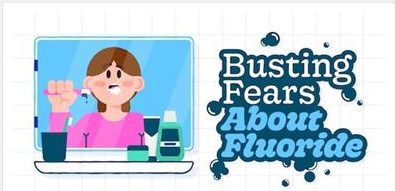 Confused about fluoride? You’re not alone. Every day it seems a new toothpaste pops up on a shelf proud of its “fluoride-free” status. The desire of today’s buyers to consume “clean” and “natural” products drives the market to produce more and more items that are free of certain, some misunderstood, chemicals or substances. Some substances, for sure, are things we don’t want in our bodies. But is fluoride one of them?
Confused about fluoride? You’re not alone. Every day it seems a new toothpaste pops up on a shelf proud of its “fluoride-free” status. The desire of today’s buyers to consume “clean” and “natural” products drives the market to produce more and more items that are free of certain, some misunderstood, chemicals or substances. Some substances, for sure, are things we don’t want in our bodies. But is fluoride one of them?
What is fluoride?
Fluoride is a naturally occurring mineral present in soil, water, plants, and animals. Its use in the dental industry dates back to the early 1900s. A dentist in Colorado Springs, Colorado noticed a ubiquitous, strange brown discoloration on his patients’ teeth accompanied by a mysterious lack of tooth decay. It took him and fellow researchers 30 years to discover what caused this: high levels of naturally occurring fluoride in the local water supply.
Today, this brown discoloration is known as “fluorosis” and results when children are exposed to too much fluoride in their first eight years of life (when teeth are still coming in).
When was fluoride added to our water supply?
Research was done to determine the amount of fluoride that could be present in water without causing fluorosis. After this, researchers in Grand Rapids, Michigan wanted to see if adding fluoride to water would prevent dental decay in the general population. In 1945, Grand Rapids was the first city to fluoridate its water. Researchers followed 30,000 school-age children over a period of 15 years and found that the caries rate (rate of tooth decay) dropped more than 60 percent. Adding fluoride to water was considered a huge scientific breakthrough in the prevention of tooth decay.
Since that time, many more U.S. cities have fluoridated their water, and more regulations have been put in place to ensure that the correct amount is present at any given time. According to the Centers of Disease Control, water fluoridation is considered one of the Ten Great Public Health Achievements of the 20th century.
How does fluoride prevent tooth decay?
- In saliva, fluoride helps remineralize tooth enamel. That means if a cavity has started forming, fluoride can remineralize it and prevent further decay
- Fluoride in the mouth interferes with cavity-causing bacteria from converting sugar to acid
- When fluoride is ingested in childhood, it helps make tooth enamel more resistant to acid
What are the risks associated with fluoride?
Here’s what you really want to know! As with most things (even water!), too much fluoride can have negative health effects. Fluorosis, of course, is one them. In extreme cases, teeth can have brown spotting and weakened enamel. In milder cases, the staining is white but the condition is cosmetic and does not negatively affect the teeth.
Another effect of excess ingested fluoride is skeletal fluorosis, which causes stiffness and pain in the joints and in extreme cases can lead to calcification of tendons and ligaments and bone deformities. Skeletal fluorosis is rare in places where water supplies are closely monitored for fluoride levels.
Another risk of too fluoride is if you ingest enough to cause upset stomach, vomiting, seizures, and other symptoms. It is very difficult to ingest this amount, but if you suspect a fluoride overdose, you should call the Poison Help Hotline.
Is fluoride a neurotoxin? There are some studies on animal and human populations linking fluoride with lower IQ levels. The Lancet Neurology, however, says such research is inconclusive. According to their report, “No credible scientific studies show a relation between fluoride consumption and IQ levels; however, several have shown that fluoride ingested at recommended levels is not harmful.”
So … is it safe?
Every major health organization agrees that fluoride, at the correct level, is safe and beneficial for our dental health. This is backed by decades of research. For further study, check out the Campaign for Dental Health.
When you are scouring the internet for information on fluoride, be mindful of where the information is coming from and how credible their claims might be. You can also ask your dentist about his or her views on fluoride.
© 2019 Revenue Well Systems, LLC
